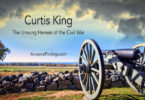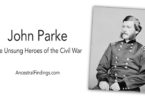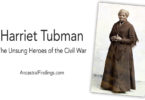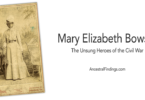Born April 10, 1833, in Huntingdon, Pennsylvania, David McMurtrie Gregg became a celebrated and quite underappreciated, cavalry general in the Civil War. His parents were Matthew Duncan Gregg and Ellen McMurtrie, and he had eight siblings; he himself was the third of nine children in the family. His parents were known to be quite politically active in their area.
David’s father was a lawyer and iron master and was part owner of the Potomac Furnace iron works in Loudon County, Virginia. David’s grandfather on his father’s side, Andrew Gregg, was a US Congressman from Pennsylvania, who served first in the House of Representatives and then in the Senate between 1791 and 1813.
When David was twelve years old, his father died of a severe fever, which was common at the time, and could have been a symptom of any number of acute diseases that often went undiagnosed, such as typhus, malaria, or scarlet fever. Afterward, David’s mother moved the family to live with relatives in Hollidaysburg, Pennsylvania. Unfortunately, his mother died just a year after his father, and the siblings were scattered among relatives who were willing to care for them. David and his older brother Andrew went to live with their uncle on their mother’s side, David McMurtrie III in Huntingdon, Pennsylvania.
Their uncle ensured that Andrew and David received excellent educations. David attended the John A. Hall School and the Milnwood Academy, before following Andrew by enrolling at the University of Lewisburg (later called Bucknell University). A representative in the Pennsylvania state house secured a position for David at the United States Military Academy, but Andrew died before he enrolled.
A few months after Andrew’s death, David enrolled at West Point. There, he gained a reputation as an exemplary horseman, which contributed to his later celebration as a top cavalry officer. David graduated from West Point on July 1, 1855, where he was eighth in a class of thirty-four students. He met his future wife, Ellen Frances Sheaff, at his West Point commencement ceremony. She was there because she was the granddaughter of a former governor of Pennsylvania. David and Ellen married eight years later, during the Civil War, and had two sons, George Sheaff Gregg and David McMurtrie Gregg, Jr.
After graduating from West Point, David received a commission as a brevet second lieutenant with the Second US Dragoons Regiment, which was a heavy cavalry regiment. His first assignment was in the territory of New Mexico, then his unit was sent to California. While in California, he and his friend Dorsey Pender bought a racehorse together. His until then marched on to Fort Vancouver in the territory of Washington. David was involved in combat for the first time at Fort Vancouver when his unit of 160 men engaged with one thousand Native Americans. The Natives outnumbered the cavalry and surrounded them. The fighting lasted for three days, but casualties were minor. David managed a dignified retreat for his men.
When the Civil War started, David went back to Washington, D.C., where he joined the Union Army and was promoted to Captain of the 3rd US Cavalry. He was swiftly transferred to the 6th US Cavalry. He contracted typhoid fever there (which was common amongst Civil War soldiers on both sides for the duration of the war), and was almost killed when the D.C. area hospital in which he was staying burned down. He became a Colonel in the 8th Pennsylvania Cavalry in January of 1862.
He was present at the Battle of Antietam, though his unit played only a small role. He was promoted to Brigadier General just before the Battle of Fredericksburg. Again, the cavalry was held in reserve and not used much. This was the situation Gregg found himself in during many of the battles in which he was involved. However, he distinguished himself as a superior horseman and was able to protect other cavalry members during retreats. He also led the cavalry in a number of engagements, such as Aldie, Middleburg, and Upperville.
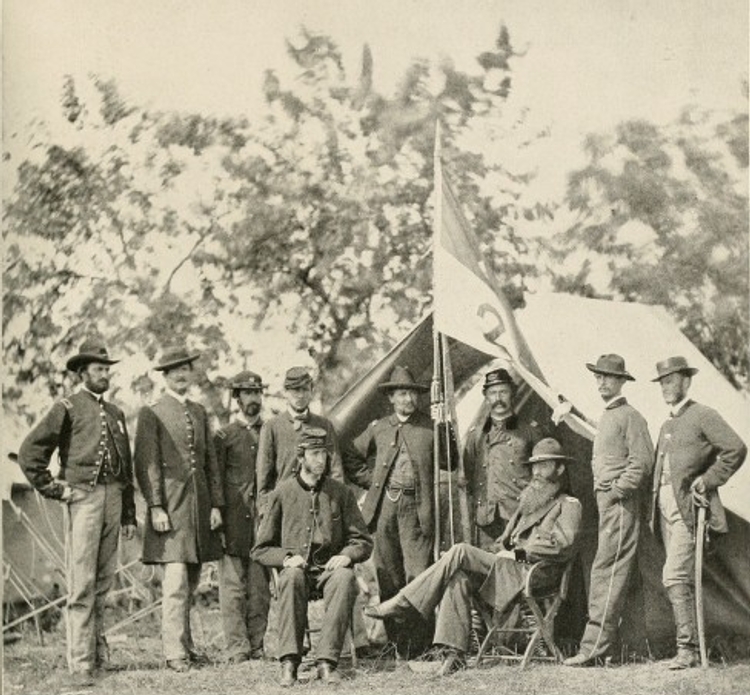
Union General David McMurtrie Gregg (seated with slouch hat and beard) and his staff (Wikipedia)
One of the biggest battles in which David was involved was three miles east of Gettysburg, during the actual Battle of Gettysburg, in a place that is now called East Cavalry Field. The Confederate forces collided with David’s men, as well as the brigade of Brigadier General George A. Custer. It was a lengthy cavalry battle that also included hand-to-hand combat, and both the Confederacy and the Union claimed victory when it was over. Afterward, David took his men north to Chambersburg, Pennsylvania.
David was transferred among different units quite a few times during the war and always provided exemplary service as a leader of a cavalry regiment. In fact, he caused a bit of a fuss when he felt like he did not get enough of a mention in Major General George G. Meade’s after-action report of a battle in Warrenton, Virginia, and he demanded a court of inquiry correct the report to adequately describe his participation.
David distinguished himself in so many Civil War battles that he was eventually promoted to the rank of Brevet Major General. However, after more than three years of distinguished and respected service, he abruptly resigned his commission shortly before the end of the war, in January of 1865. The reason for this is still a mystery, and David himself only cited a greater and pressing need for him at home in his resignation letter. He stated there was an
“imperative demand for my continued presence at home that my personal attention may be given to pressing private duties and business, that I can no longer defer action to secure my discharge from the service.”
He moved to Reading, Pennsylvania, which was his wife’s hometown, and farmed near Milford, Delaware, but he missed the excitement of the Army and found farming life dull. He applied for reinstatement to the Army after the war, in 1868, but was denied in favor of his cousin, John Irving Gregg. US President Ulysses Grant appointed David as US Consul to Prague in Austria-Hungary, which he enjoyed, but had to leave that post, too, and return home soon after accepting it because his wife was unhappy there.
At home, David continued to be active in political affairs and raised funds to preserve Valley Forge as a national historic site. He also gave speeches at local events as a celebrated Civil War veteran and was elected to a term as the Pennsylvania Auditor General in 1891.
When David died on August 7, 1916, in Reading, Pennsylvania, he was one of the oldest survivors of the Civil War from that state at eighty-three years old. He was buried in Reading at the Charles Evans Cemetery. There is a bronze statue of him on a horse in Reading, and the American Legion Post in Reading is called the Gregg Post, after him.

